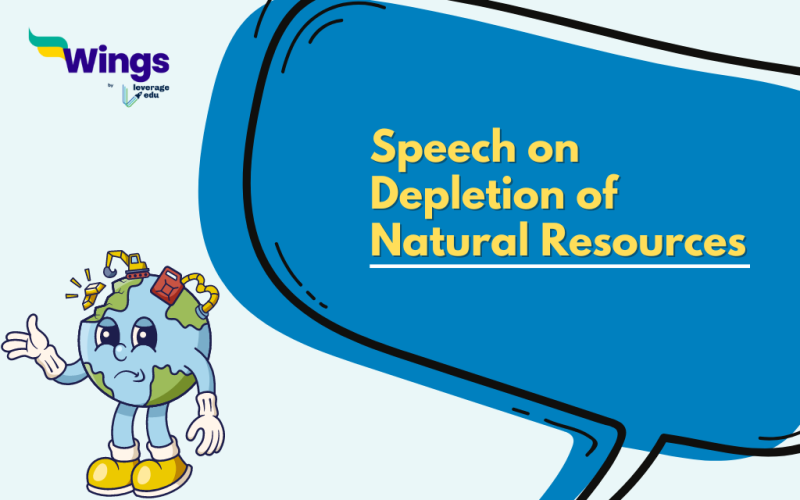Speech on Depletion of Natural Resources: This page will discuss a speech on the Depletion of Natural Resources for school students. Natural resources are limited in number and eventually, there will come a time when we are out of these precious living-giving resources. Global communities, governments, NGOs, and influencers are trying to build a sustainable environment for everyone. Before exploiting or even consuming natural resources, we have to understand that ‘The Earth Does Not Belong to Us: We Belong to the Earth’.
Table of Contents
3 Minute Speech on Depletion of Natural Resources
| ‘Good morning, respected teachers and dear friends. Today, I stand before you to address a critical issue that affects not only our present but also the future of our planet: the depletion of natural resources. We rely on the Earth’s finite resources daily to fuel our economies, sustain our lifestyles, and support our growing population. However, our relentless consumption and exploitation of these resources have pushed many to the brink of depletion. Consider our forests, the lungs of our planet, which are disappearing at an alarming rate due to deforestation. These precious ecosystems provide habitat for countless species and play a crucial role in regulating our climate and water cycles. Yet, we continue to clear them for agriculture, logging, and urban development without fully grasping the consequences. Similarly, once teeming with life, our oceans are now facing unprecedented threats from overfishing, pollution, and habitat destruction. As we plunder their depths for fish, minerals, and oil, we disrupt delicate marine ecosystems and endanger countless species, some of which we haven’t even discovered yet. And remember our dwindling freshwater reserves, essential for drinking, agriculture, and sanitation. With growing populations and increasing industrialization, many regions are already experiencing water scarcity, leading to conflicts and humanitarian crises. But we should be concerned about more than just the environmental impact. The depletion of natural resources also has profound social and economic implications. As finite resources become scarcer, competition for access to them intensifies, leading to conflicts, inequality, and geopolitical tensions. So what can we do to address this pressing issue? First and foremost, we must recognize that we are all stewards of the Earth and take responsibility for our actions. We must adopt more sustainable practices in our daily lives, whether reducing our energy consumption, recycling more, or supporting companies that prioritise environmental stewardship. Furthermore, we must hold governments and corporations accountable for their actions and advocate for policies that promote conservation, sustainable development, and the protection of natural habitats. Ultimately, the depletion of natural resources is not just an environmental issue; it’s a moral imperative. We owe it to future generations to be responsible custodians of our planet and ensure inheriting a world rich in biodiversity, clean air, and fresh water. Thank you! |
Quick Reads: Speech on Importance of Forests in English for Students
Conventional vs Non-Conventional Resources
Conventionally, the world has heavily depended on fossil fuels—coal, oil, and natural gas—as primary energy sources. However, the environmental consequences, including greenhouse gas emissions and climate change, have prompted a paradigm shift towards non-conventional resources.
- These alternative sources, such as solar, wind, and geothermal energy, offer sustainable alternatives with significantly lower environmental impacts.
- Solar energy harnesses the sun’s radiation through photovoltaic cells or solar thermal systems, providing clean and renewable power.
- Wind energy utilizes the kinetic energy of the wind to generate electricity through wind turbines, offering a scalable solution for clean energy production.
- Geothermal energy taps into the Earth’s heat stored beneath the surface, offering a reliable and constant source of power.
- Embracing non-conventional resources not only mitigates environmental degradation but also enhances energy security, reduces reliance on finite fossil fuels, and fosters innovation and economic growth.
Transitioning towards a future powered by renewable and sustainable energy sources is imperative for ensuring a healthier planet and a sustained tomorrow for future generations.
Why We Should Save Resources?
Saving resources is essential for several reasons. Firstly, many resources are finite, meaning they will eventually run out if consumed at current rates. Conserving resources ensures their availability for future generations. Additionally, resource extraction and consumption often lead to environmental degradation, such as deforestation, habitat destruction, and pollution.
By saving resources, we reduce our ecological footprint and minimize the negative impact on ecosystems and biodiversity. Furthermore, saving resources can lead to economic benefits by reducing production costs, promoting efficiency, and fostering innovation in sustainable technologies. It also helps mitigate the effects of climate change by reducing greenhouse gas emissions associated with resource extraction, processing, and transportation.
Ultimately, saving resources is crucial for preserving the health of our planet, ensuring a sustainable future for humanity, and maintaining a balance between human needs and environmental stewardship.
FAQs
Ans: When resources are extracted from the environment more quickly than they can be restored, this is known as natural resource depletion. The dwindling of natural resources can be attributed to various factors, such as pollution, industrialization, population expansion, and changing consumer patterns.
Ans: The most valuable natural resources include things like timber, soil, mineral oil, petroleum, water, and oil. Since none of these resources were created by humans and are all gifts from God, they are referred to as natural resources. Although they cannot produce the natural resource, humans can alter and use it appropriately.
Ans: Make Electricity Use More Efficient.
Use More Renewable Energy.
Promote Sustainable Fishing Rules.
Avoid Single-Use Plastics.
Drive Less.
Popular English Speech Topics
For more information on such interesting speech topics for your school, visit our speech writing page and follow Leverage Edu.
 One app for all your study abroad needs
One app for all your study abroad needs













